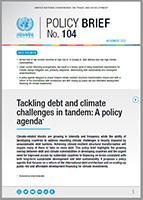
Climate-related shocks are growing in intensity and frequency while the ability of developing countries to address mounting climate challenges is heavily impaired by unsustainable debt burdens.
Achieving climate-resilient structural transformation will require many of them to take on more debt.
This policy brief highlights the growing overlap between debt and climate vulnerabilities in developing countries and the urgent need for improved access by vulnerable countries to financing on terms consistent with both long-term sustainable development and debt sustainability.
It proposes a policy agenda that focuses on a reform of the international debt architecture and on scaling-up public-led and affordable development financing for climate investments.
Key points:
- Almost half of low-income countries at high risk of, or already in, debt distress also has high climate vulnerabilities.
- Under current financing arrangements, the result is a vicious cycle of rising investment requirements for climate change mitigation and, primarily, adaptation, deteriorating debt sustainability and consequent under investment.
- A policy agenda designed to propel forward climate-resilient structural transformation should start with a reform of the international debt architecture and with scaling up public-led and affordable development financing for climate investments.


